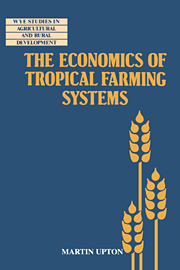14 - Budgeting
Published online by Cambridge University Press: 05 June 2012
Summary
The need for farm planning
Farm planning means assessing the implications of allocating resources in a particular way before deciding whether to act. It is an essential part of rational decision-making, and we have assumed in earlier chapters that farmers actually do plan what to produce and how to produce it. Thus planning is part of the day-to-day activity of running a farm; but it is particularly important when changes in the farm system are being considered. Few farmers would be willing to adopt an innovation without first evaluating the consequences.
However, for many farmers, planning is subjective and informal. Only on larger, commercial farms, where records and accounts are kept is it likely that formal procedures, such as budgeting are used. None the less, these practices are useful, not only in allowing closer control of the farm system, but also in persuading credit agents to provide loans. Thus there are good reasons for encouraging more farmers to keep records and accounts and to prepare budgets for proposed changes in their farming activities.
Farm planning techniques are also used by researchers, advisors and development planners, in two different ways. On the one hand, farming systems researchers and farm advisors are concerned to prescribe what farmers ought to do in order to advise on how systems can be improved. Development planners, on the other hand, may wish to predict how farmers will respond to changes in prices, institutions or technology.
- Type
- Chapter
- Information
- The Economics of Tropical Farming Systems , pp. 299 - 314Publisher: Cambridge University PressPrint publication year: 1996



